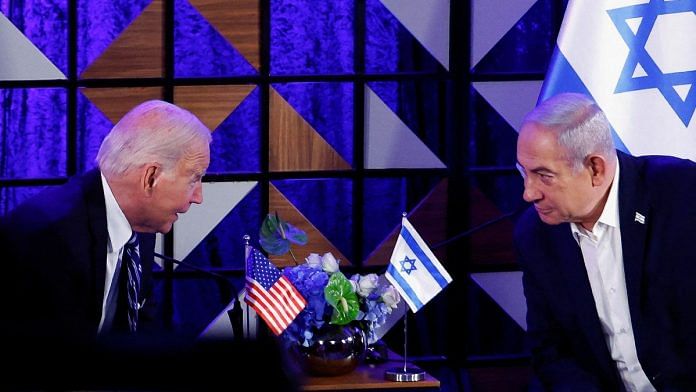We are now in the fifth week of the Israel-Hamas war in Gaza.
One important thing that stands out is how while there is a lot of criticism of Israel, most Western countries — who are aligned with Israel and support its right to self-defence — abstained in a vote at the UN General Assembly.
But the US, a major Western power, voted against the resolution calling for the protection of civilians in Gaza, while almost all of its NATO allies abstained. Others who voted against it were mostly Pacific island countries. And just last month, the US vetoed a UN Security Council resolution asking for a humanitarian pause in fighting in the Gaza Strip.
It is, therefore, crucial to understand how important Israel is to America.
Also Read: What, when, where, why & how of the Israel-Hamas war
Let’s start chronologically. Forty-two years ago, on 7 June 1981, eight newly-acquired F-16s of the Israeli air force, escorted by six F-15s, flew more than 1,600 km — over the landmass of Jordan and Saudi Arabia, both hostile to Israel — to bomb an under-construction nuclear reactor in Iraq.
Once again, Israeli aircraft flew right across Jordan and Saudi Arabia to carry out this bombing, which means both these Western allies were complicit. The story goes that the King of Jordan was holidaying on his yacht, saw these aircraft fly overhead, recognized the markings and instead of alerting people, thought this was an exercise gone wrong.
Those F-16s were part of the first tranche of F-16s, equipped with gravity bombs, which the US sent to Israel. Pakistanis got them too.
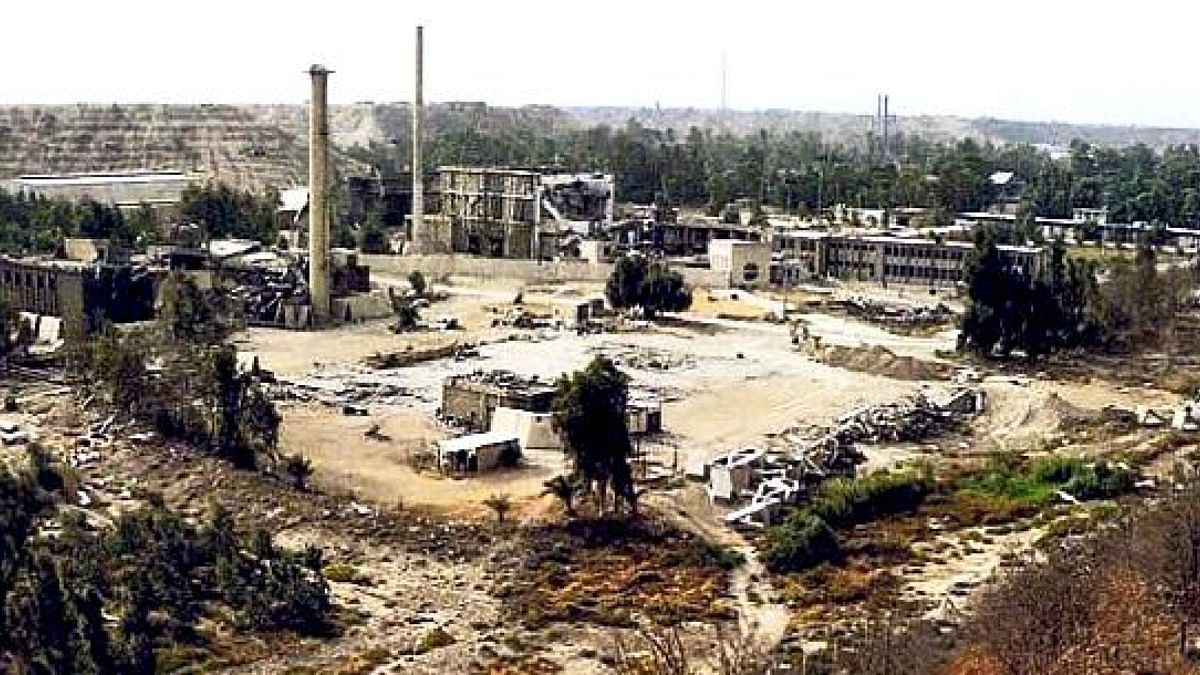
Immediately after the bombing of the Osirak reactor, the government of Menachem Begin in Israel faced condemnation from all quarters, including the US. At the time, the noted cartoonist R.K. Laxman contributed to the front page of the Times of India a cartoon showing then US President Ronald Reagan sitting in the Oval Office and telling his aides not to be too critical of the Israeli prime minister or he may bomb the White House next.
This shows how Israel has much impunity when it comes to the US, which is why the Americans have stayed with Israel despite many of its actions in the West Bank — after the First and Second Intifadas — and its annexation of Golan Heights.
Also Read: How India voted at UN General Assembly on Israel-Palestine issue over the years
The second incident, which happened yesterday and goes on to show that the Americans, beyond some occasional words of criticism, will not do anything adverse to Israel’s interests, was the censure of Congresswoman Rashida Tlaib of the Democratic Party — the only person of Palestinian descent currently a member of the US Congress.
In the nearly 233-year history of the US Congress, only 24 members had been censured until yesterday – the average being one every decade.
According to the text of the resolution moved against her, Tlaib became the 25th member of the US Congress to be censured because within 24 hours of Hamas’s attack on Israel on 7 October, she “defended brutal rapes, murders, beheadings and kidnappings by Hamas as justified resistance to the Apartheid State (Israel)”.
The very next day, the resolution added, she made another statement that the attack by Hamas was a result of the US providing Israel with protection. It also said that Tlaib “continued spreading false information” that the Al-Ahli hospital in Gaza was bombed by Israel, despite American intelligence and US President Joe Biden stating that this was not true.

Finally, on 3 November, she shared a video which used the Palestinian slogan: “From the river to the sea, Palestine will be free.”
Tlaib defended it, saying these slogans are an “aspirational call for freedom, human rights and peaceful coexistence, not death, destruction or hate”.
However, Israelis and many in the Western world see this slogan not only as a statement of anti-semitism but also as hate speech. They believe that it implies that Israel will be destroyed and all Jews exterminated.
The censure was passed with 234 voting in favour of it and 188 against. Of the 212 Democrats in the US House of Representatives, 22 voted in favour of the censure. The Republicans all voted in favour of the censure, barring four who voted against it.
For a political system to censure a lawmaker of the ruling party, given that President Biden is a Democrat, has to be unusual. But this also underlines the nature of the US-Israel relationship.
Also Read: How ‘jiski jitni hissedari’ pushed Lebanon into never-ending ‘failed state’ spiral
The US-Israel relationship did not start out being so cosy, although the then US President Woodrow Wilson supported the formation of Israel in 1919 when he said he believed that the Jewish people deserved a homeland.
This was two years after the Balfour Declaration, named after the then British Foreign Secretary Arthur Balfour who wrote a note to Lord Rothschild, who was a leading light of the Jewish community in Britain.
In the letter — the text was published on 9 November 1917 — Balfour talked about the creation of a state for Jews in the Israel-Palestine region.
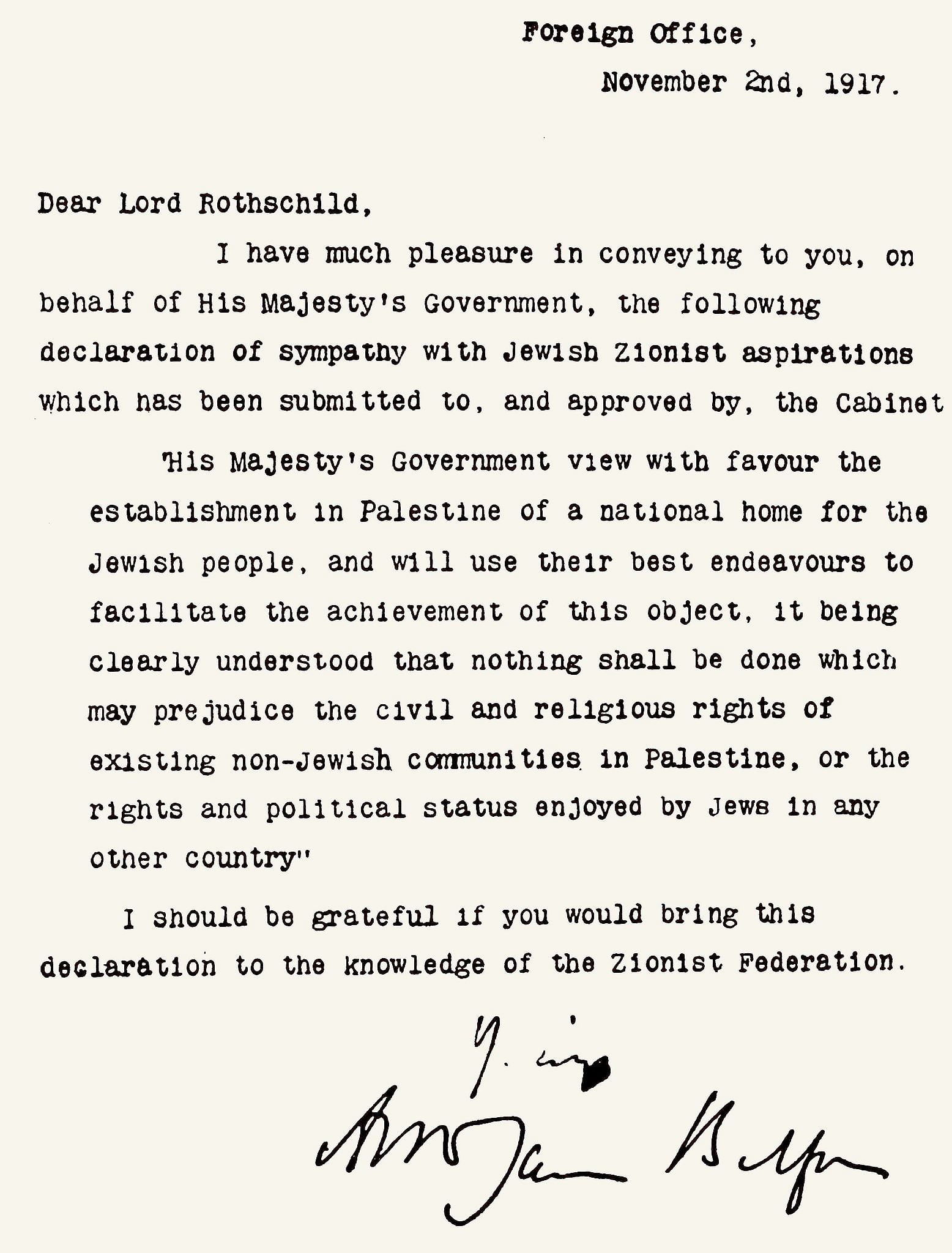
This region was critical during the First World War since this was where the Germans and Ottomans were fighting the British. At the time, the region was controlled by the Ottomans; the Americans had not suffered their first casualty yet; and the Russians were caught in the Bolshevik revolution.
That’s when the Battle of Beersheba took place, which then became a turning point in that war. Beersheba is in present-day Israel, on the edge of the Negev desert. It was heavily defended by the Ottomans and the Germans but the combined British and Australian forces, with help from Jewish forces, broke through and eventually reached Gaza.
That led to the idea that the Jews would now get a nation, what they saw as their promised land. Until then, the Jews were a small minority in the Ottoman-ruled Palestinian region.
That said, the Americans successively supported the creation of the state of Israel. The US Congress passed resolutions in 1922 and 1944 endorsing the idea. But the US was never unqualified in its support for Israel.
In 1948, the US became the first country to recognize Israel, within minutes of the proclamation of its formation.
Cut to 1956. The Suez Canal was controlled by a privately owned Anglo-French company. In 1956, Gamal Abdel Nasser, the president of Egypt, decided to nationalise the canal. His reason for doing so was that the British and French had committed to giving funds for the construction of the Aswan dam on the Nile, which was vital for Egypt.

Since they went back on that commitment, Nasser decided to nationalise the Suez Canal and said it would allow Egypt to earn revenue from ships passing through. The Americans, though they stayed out of this and were critical of Egypt, said they wanted a diplomatic solution. However, the French and the British were more impatient and decided not to fight directly.
They entered into a secret pact with Israel, whereby Israel would invade the Sinai desert and reach the Suez Canal. That’s when the Israelis first captured Gaza. At the time, Israel also wanted to target Sharm El-Sheikh since they wanted access to the Straits of Tiran — which connect the Gulf of Aqaba and the Red Sea — thinking the Egyptians might block it.
To add to that, the Israelis were also irritated with the Egyptians for backing some Palestinian raids into their territories.
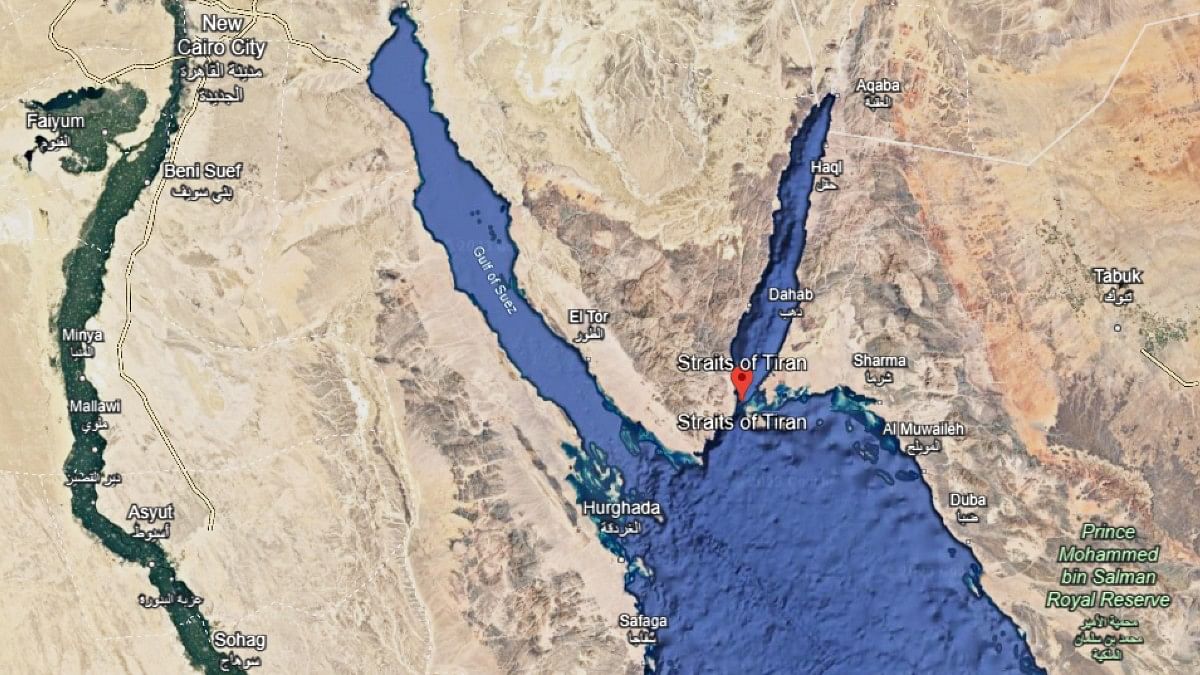
The plan was for the Israelis to invade Sinai and for Britain and France to then criticise Israel, and once Israelis got close to the Suez Canal, both colonial powers would land paratroopers there and take credit for saving it.
However, the US took a position that was very critical of Israel. Once the war ended, Americans also demanded that Israelis vacate all territories they had captured — and Israel complied. At the same time, Israelis were guaranteed access to the Straits of Tiran, which was a gain for them.
Also Read: Who are Houthis, why Iran is arming them & what this means for Israel
Next, the Six-Day War in 1967. The Israelis were hardly using any American equipment at the time and mostly relied on British and French equipment, including the Mirage aircraft.
On the other side, Egypt and Syria were armed by the Soviets. Besides top-of-the-line weapons, they also had Soviet advisors working with them.
However, Israel defeated them in six days and has since come to be seen as a bulwark both against militant/political Islam and rising communism in the Middle East.

Remember, many big countries in the Middle East — Iraq and Syria, for instance — were ruled by the Baʿth Party, which derived its power not from Islam but from its popular appeal of socialist Arab nationalism. At one point, Egypt and Syria became one country, the ‘United Arab Republic’. Iraq and Jordan, too, set up a confederation called the ‘Arab Federation’.
Since the Baʿth Party was deeply influenced by the Soviets and relied on them for weapons, the Americans saw Israel as a bulwark against the growth of communism in the Middle East. From then on, Israel has been a stalwart ally of the US, although their’s is not a treaty-bound relationship.
In the 1973 Yom Kippur war, Israel was only able to survive because of American support. Taking the Israelis by surprise, Egyptians were making rapid advances into Sinai; there was a threat even to the Israeli mainland. At the same time, the Syrians were threatening to recapture Golan Heights.
That’s when the Americans set up an air bridge to ensure round-the-clock supplies could reach the Israelis and help them recover and launch counterattacks.
Also Read: Israel is angry, Netanyahu poised for Gaza invasion. But there are limitations to military power
Cut to the 1970s and 1980s, American influence ultimately led to the Camp David Accords whereby Israel made peace with Egypt and returned its territories in exchange for Egypt recognising the state of Israel. This was followed by normalisation of Israel’s ties with Jordan.
In the early 1990s, after the First Intifada, Americans got involved with Israel. The Oslo Peace Accords were the closest the Israelis and the Palestinians came to a settlement. The Israeli side accepted the need for a Palestinian state and the Palestinian side agreed to recognise Israel.
That is the essential difference between the Palestinian Authority in the West Bank and Hamas in Gaza. One recognises Israel and its right to exist, while the other does not.
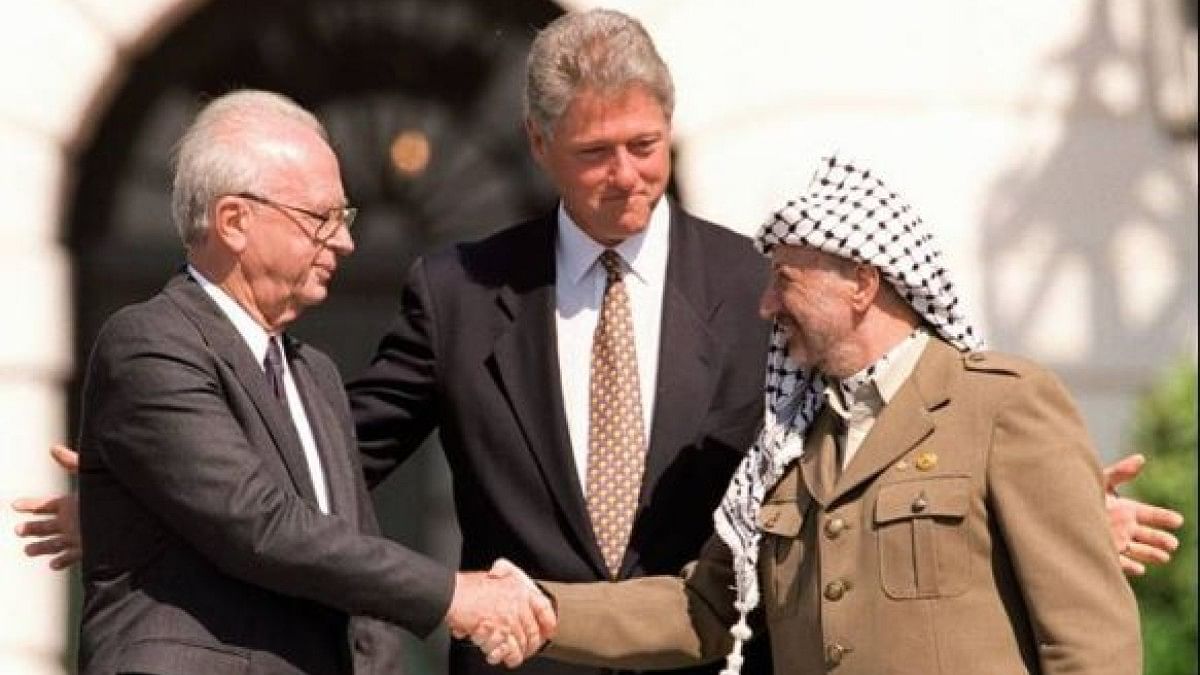
In this situation, though the Americans have been increasingly inclined towards Israel, the relationship has varied from leader to leader. Some American presidents have had a fraught relationship with their Israeli counterparts — Obama and Netanyahu, for instance. Then came Trump, who completely changed the dynamics of the US-Israel relationship.
He recognised Jerusalem as the capital of Israel and shifted the US Embassy there; his administration recognised Israel’s annexation of Golan Heights, which it had captured from Syria; and withdrew from JCPOA.
The Joint Comprehensive Plan of Action or JCPOA was an agreement that Obama thought would persuade the Iranians against developing a nuclear weapon in exchange for concessions, including the lifting of sanctions.
But the Israelis, who always believed the Iranians would never stick by that commitment, wanted the US to withdraw from JCPOA — which Trump did.

In conclusion, there is a lot of theorising about this special relationship between the US and Israel. There are also many conspiracy theories about Jews controlling the financial markets, etc.
There is a very strong Jewish or Israeli lobby in America but they don’t dictate American policy. Countries don’t become superpowers because they let lobbies run their policy, they become superpowers because they let their larger national interest determine their policy.
For the Americans, it’s very important that some kind of order is maintained in the Middle East, hostility to the American investor does not go too far and oil-bearing states are protected.
That is why Israel, a vital Western Enclave in the Middle East, has become more vital than it has been at any given time since the end of the Cold War.
This is an edited transcript of ThePrint Cut The Clutter Episode 1343, published on 8 November 2023, on the origins of US-Israel ties & why Israel is vital to Western interests.
Also Read: In this war of dead baby pictures, yours versus mine, the question of who’s the victim will be lost


